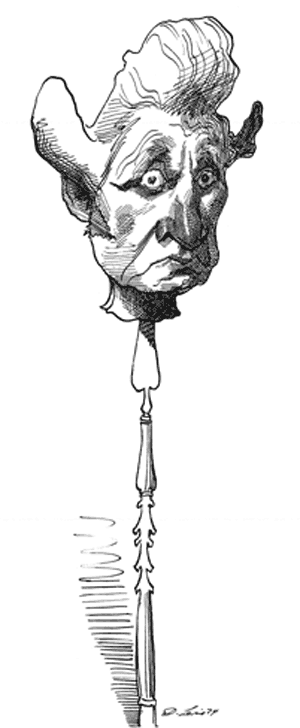The qualities that make for success are at times baffling. G. H. Hardy, the great English mathematician, used to delight to point out that high intelligence was the least important quality for success in most human situations. Judgment he regarded as having little to do with intelligence (a view that may have been fortified by his friendship with Bertrand Russell); but even judgment, he thought, was of far less significance than application, a capacity to take risk, and luck. No one can make the most of his talents without constant application, or without taking frequent risks. Of course, Hardy allowed the importance of sheer gift—after all, that was the world he operated in; whatever else they may be, mathematicians, like musicians and painters, are gifted men. Gifted men are rare, but success is not uncommon in any age: And these considerations are peculiarly apt with regard to the fame of Captain Cook.
Cook started with no advantages. The son of a Yorkshire farmer, he had next to no schooling, and began his seafaring life in the coastal trade between Whitby and London. And yet he moved steadily forward by thoroughness, by competence, by taking infinite pains. He loved the tedium of surveying, of chart making, and proved an excellent draftsman. He seized every chance of advancement and went for several years to the wild shores of Newfoundland mapping with infinite care every rocky islet and cove. His management of his crew was as admirable as his maps. It was this gritty, detailed application to cartography that brought him his chance of world fame. He was selected to captain the Endeavour, which the Admiralty was sending to Tahiti to observe the Transit of Venus on June 3, 1769. This was his prime task; his second, to make sweeps into the South Pacific to find if there existed a great southern continent as another navigator, Dalrymple, who had been to Tahiti, believed, although others were skeptical.
Newfoundland had demonstrated that Cook had application. During those years he had made the most of his talents as a surveyor and navigator. To go to Tahiti was to leap at a risk. Disease usually decimated any ship away for years, and rounding Cape Horn was an appalling risk for a sailing ship in the eighteenth century. Also it meant leaving a young wife and family. Cook, however, accepted with alacrity. He was not given to doubt or fear. And then he had his luck in the shape of a rich, handsome, totally obsessed botanist—Joseph Banks, who happily paid for himself and his artists and, even better, persuaded Dr. Solander, Linnaeus’s great pupil, to go with him. Cook made the voyage successful, Banks rendered it famous.
Cook succeeded through method, not daring or imagination. A great deal was known about the Pacific, and Cook was given the best information. More pertinent was the fact that by the eighteenth century the effects of continents on the currents of the ocean were well known. All Cook was required to do was to make two great sweeps in the South Pacific—one after passing the Horn as he drove up to Tahiti; the other after leaving Tahiti on the way to New Zealand. On the latter he almost reached Antarctica. But these sweeps were conclusive.
Cook with exceptional competence carried out his orders to the letter. Banks and Solander had collected thousands of seeds, plants, artifacts of every kind. Banks was a superb promoter, and from the moment he got back to London he was everywhere—at court, in the aristocratic salons, at the Royal Society. He was extremely handsome, endowed with charm, and with the entrée to everyone, and the Pacific became so fashionable, so inflated in importance—helped too, by the activities of the French—that Cook was sent back: not once, but twice.
It is unlikely that without Banks’s enthusiasm and panache Cook would have returned either so soon or so well equipped to the Pacific. He would still have enjoyed an important position as a great navigator, but he would not have achieved the rank of British hero—along with Wolfe at Quebec or Clive at Arcot. His greatest achievements lay in his first voyage—not only the proof that there was no southern continent, but the systematic yet very rapid exploration of New Zealand. Of equal importance was the attention that he paid to his crew, keeping it almost intact until swept with fever at Batavia on the return journey—a triumph of discipline, experimentation, and observation. Cook insisted on cleanliness and antiscorbutics, whether sauerkraut, wild celery, or lime juice, and relentless activity to dispel boredom. He banished scurvy and avoided mutiny.
So long as he was not personally affronted, Cook possessed an exceptional quality for success. He could put distance between himself and events and observe coolly…. Cannibalism, ritualized sex, the strange taboos of the Polynesians he took in his stride. Pilfering irritated but did not anger him. Time and time again he restrained his sailors who longed to teach the Tahitians or the Maoris a punitive lesson. These people were only another complex rocky islet to be surveyed and noted. Such imputability, combined with a natural affability, undoubtedly helped his relationship with the Polynesian chiefs; and made his voyages the great success that they were.
Advertisement
But it was Cook’s death that lifted him to heroic status, and that was the result not of his virtues but of his defects. At times Cook’s patience, so endless seeming, snapped. Not given to flogging, he could make a sudden exception: at times he would fly into tantrums on the quarter deck. No explorer took the Polynesians’ propensity to steal with greater calm and forbearance, but on Tonga the theft of a goat enraged him so much that he made a punitive drive across the island, tearing down huts and smashing canoes. And so it was in Hawaii—the theft of a cutter aroused the greatest rage of his career, in which he determined to punish dramatically, if need be with ball and shot. Alas, Cook was overwhelmed, clubbed to death, cut up in pieces, and distributed to the great chiefs. All that was recovered were most of the bones and the hands. Clever, Cook’s second-in-command, behaved with the self-control that his captain might have envied—no recrimination, no punitive killings. But there can be no doubt that Cook’s dramatic end put the final seal of success on Cook’s career.
Even his dramatic end, however, scarcely makes Cook interesting. He was essentially a mundane, careful, methodical man of excellent judgment, rarely surprised, always coolly observant, full of application, and obsessed with a damned dull subject—surveying and map making. Only a man of similar temperament could have written this long, seemingly endless biography. It is as precise and as detailed as one of Cook’s charts of the Newfoundland coast. Nothing is omitted: no islet, no rock, no sandy bar: a biography that is as exhausting as it is exhaustive.
Yet how well matched these are, Beaglehole and Cook. Both demonstrate how application and ambition, with a little luck, can make the most of modest talents. Beaglehole is as level-headed as his hero—he attributes no great gifts to him, allows him no imagination or creative drive; like Cook’s, his judgment is always sound, his facts accurate. Nor does Beaglehole write badly: there is not one memorable phrase in the half million words, neither is there a bad sentence. And yet the result of the labor is mediocre, or rather tedious: sad but true. But then could anyone make Cook lively, even in a short book?
This Issue
May 30, 1974




